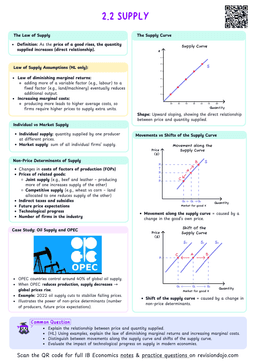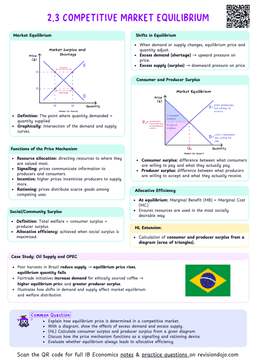There are different causes for economic inequality and poverty, including:
- Inequality of opportunities
- Different levels of resource ownership
- Different levels of human capital
- Discrimination (gender, race and others)
- Unequal status and power
- Government tax and benefits policies
- Globalisation and technological change
- Market-based supply side policies
Inequality of opportunities
Inequality of opportunities
Differences in life opportunities due to factors beyond an individual’s control.
- The concept of inequality of opportunity assumes that true equity would exist if everyone started life under identical conditions with equal access to resources: if all had equal opportunities.
- In such a scenario, individual outcomes (wealth, income, success...) would be determined solely by factors within a person’s control, like effort and hard work.
- In reality, this ideal is unattainable: factors such as socioeconomic background, systemic discrimination, and geographical disparities mean that opportunities are not evenly distributed, making this assumption unrealistic.
Examples of factors that may affect the opportunities of an individual:
- Parents' education.
- Parents' income.
- Country of birth.
- Race.
- Gender.
Different levels of resource ownership
- Resource ownership refers to the extent to which households own assets such as wealth, property, or capital that generate income.
- Some individuals benefit from inherited wealth, generating high returns, while others have no inherited access to such resources.
- Resultantly, those without inherited assets must rely solely on wages, which may not always provide sufficient income to cover basic needs or enable wealth accumulation.
- Furthermore, low-wage earners often cannot afford to buy property and must rent instead, which often consumes a significant portion of their income, further limiting their ability to save or invest. Overtime, this cycle of poverty exacerbates economic inequality.
Different levels of human capital
Human capital
Skills, abilities, good health, and knowledge utilized by people to increase their productivity.
- Wealthier individuals can afford better schooling and higher education, providing them with more opportunities to accumulate human capital and secure higher-paying jobs.
- On the other hand, low-income individuals may face barriers such as expensive tuition fees, limited access to quality schools, or early entry into the labor market, preventing the acquisition of high-income-paying skills.
- Since people without high human capital are often restricted to lower-paying jobs, the differences in human capital tends to widen income inequality.
- Furthermore, lower levels of human capital in one generation can perpetuate inequality in the next. This is because parents with lower income and limited education often cannot provide their children with the resources to develop higher levels of human capital.
Human capital also includes levels of health:
- Low-paying jobs are often more physically demanding or health-damaging, which can worsen health outcomes for lower-income individuals.
- This contributes to further inequality between the rich and the poor, as poor health can reduce productivity and limit income opportunities.


